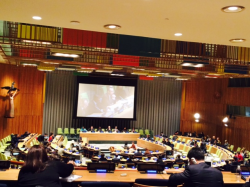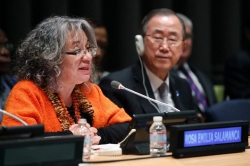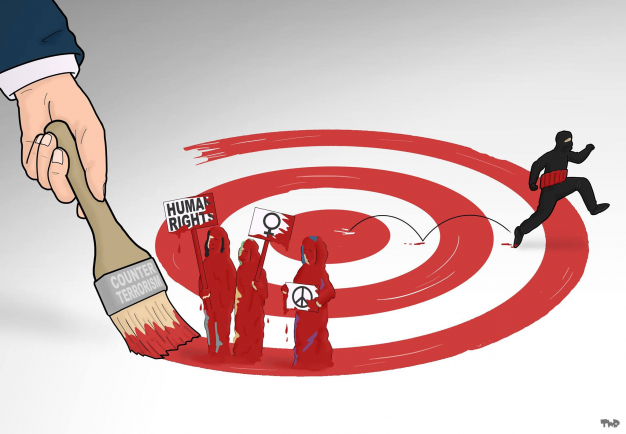Brief by Post-2015 Women's Coalition
Thematic Debate of the General Assembly: Ensuring Stable and Peaceful Societies April 24-‐25, 2014
New York, NY
Download the Brief in PDF
Three grassroots women, peace & security activists joined the Thematic Debate of the General Assembly on “Ensuring Stable and Peaceful Societies” (April 24-25) - highlighting linkages between peace, development and active participation of women for the Post-2015 agenda. After an open call by the Post-2015 Women's Coalitions, Rosa Emilia Salamanca (Colombia), Sharon Bhagwan Rolls (Fiji) and Nagwa Gadaheldam (South Sudan) were selected to participate in the UN Thematic Debate. The Women Peacemakers Program was closely involved in the facilitation process, both by sharing the call for nominations widely, as well asa member of the selection committee of the Post-2015 Women's Coalition. Congratulations to the Post-2015 Women's Coalition for facilitating these women to be heard at the UN! It is of utmost importance that feminist perspectives on peace and security are heard and incorporated in the post-2015 agenda, with active participation of women peace activists. Only then can we ensure a transformative post-2015 agenda for all.
The General Assembly Thematic Debate on “Ensuring Stable and Peaceful Societies” was held at UN Headquarters in New York from 24-‐2 April 2014. Over the course of the two days, nexus between sustainable development, peace and security; strengthening national institutions; and a global partnership for stable and peaceful societies were discussed with the objective of informing and complementing the work of the Open Working Group on Sustainable Development Goals, being co-‐chaired by the Permanent Missions of Hungary and Kenya.  H.E. Mr. John W. Ashe, President of the 68th General Assembly, who stressed the importance of peace and stability for ensuring sustainable development, opened the thematic debate. “Achieving the overarching goal of eradication of extreme poverty will remain an elusive ideal and dream, out of reach of those who most need it, unless we work together to end conflict and instability, and to promote inclusiveness, good governance, the rule of law, and human rights, including the right to development for all” Ashe stated.
H.E. Mr. John W. Ashe, President of the 68th General Assembly, who stressed the importance of peace and stability for ensuring sustainable development, opened the thematic debate. “Achieving the overarching goal of eradication of extreme poverty will remain an elusive ideal and dream, out of reach of those who most need it, unless we work together to end conflict and instability, and to promote inclusiveness, good governance, the rule of law, and human rights, including the right to development for all” Ashe stated.
UN Secretary General Mr. Ban Ki Moon followed with his opening remarks and reiterated the need for considering best ways of promoting stable and peaceful societies in the current discussions on the post-‐2015 development framework. He cited peace and stability as fundamental development outcomes within the context of personal security and enabling people to feel safe as they go about their daily lives. He further stressed the need for children to feel safe going to school; for women to be free of violence at home and their workplace, and for all people to feel secure in their neighborhoods whatever their ethnicity and sexual orientation.  Ms. Rosa Emilia Salamanca, the civil society keynote speaker, gave a powerful statement on the linkages between sustainable development, peace and stability, and their integration into national development strategies. She highlighted where lack of access to public services or rights, such as education or health, that particularly affect women and girls, are magnified in conflict-‐affected countries reinforcing the link between peace and development. “There is no peace without development and no development without peace—and neither peace nor sustainable development without the active participation of women in both processes,” she stated. Ms. Salamanca also cited the current status of global military spending which has reached 1.7 trillion dollars, nearly 5 billion dollars per day, and how this should instead be directed to build sustainable peace and be invested in programs that work toward this end for the attainment of sustainable development.
Ms. Rosa Emilia Salamanca, the civil society keynote speaker, gave a powerful statement on the linkages between sustainable development, peace and stability, and their integration into national development strategies. She highlighted where lack of access to public services or rights, such as education or health, that particularly affect women and girls, are magnified in conflict-‐affected countries reinforcing the link between peace and development. “There is no peace without development and no development without peace—and neither peace nor sustainable development without the active participation of women in both processes,” she stated. Ms. Salamanca also cited the current status of global military spending which has reached 1.7 trillion dollars, nearly 5 billion dollars per day, and how this should instead be directed to build sustainable peace and be invested in programs that work toward this end for the attainment of sustainable development.
The thematic debate panelists that followed the opening focused on the challenges faced in linking peace and security with development discussions. Ms. Sofia Mesquita Borges, Permanent Representative of Timor Leste to the UN, shared her country’s experience in the post-‐conflict reconstruction and rehabilitation processes. She stated that despite the pouring of massive amounts of resources into the country for this purpose, the country kept on deteriorating to various state of unrest that necessitated the rethinking of its development agenda to having peace at the heart of development. In this regard, Timor Leste opted out of being included in the UN Security Council agenda and also did not want to be included in the Peacebuilding fund configuration, but rather asked UN Secretary General for a development advisor which has now alleviated Timor Leste to an aid giving country. Mr. Magdy Martinez-‐ Soliman, UNDP, followed by highlighting the critical need for conflict prevention as it costs more to respond to conflict than to preventing it—10 dollars in recovery cost to be exact. He also pointed out that inclusive and participatory political processes are essential in rebuilding trust among government, civil society and citizens of a country. Ms. Clare Lockhart, Institute of State Effectiveness, highlighted that efforts to gain peace often come at the expense of other development efforts, “Security can come from other means, but stability can only come from winning the trust of citizens,” she stated. Jeffrey Sachs, Columbia University, emphasized that as a result of various geopolitical factors, the main cause of most conflicts in the world is extreme poverty and stated, “by fighting poverty, we are also enforcing peace.”
Ms. Sharon Bhagwan Rolls and Ms. Nagwa Gadaheldam, who were both nominated and speaking on behalf of the Post 2015 Women’s Coalition, highlighted and stressed the need for recognizing that gender equality, development, and peace are mutually interconnected parts of sustainable development, and called on member states to support an integrated approach that puts people over profit and those at the bottom rungs of society at the center. They both emphasized that peace requires changing business as usual as well as changing the current structure for including a clear mandate and mechanisms for civil society participation within and beyond the Post-‐2015 agenda. “Through women’s eyes, there is a broader notion of security—one that is defined in human, rather than in military, terms—one where peace is possible because all citizens have faith in and are able to freely participate in the democratic process of institution and state building” Ms. Rolls stated.
In the interactive session of the debate, Member States delivered statements and directed questions to the panelists. Some such as Timor Leste, Paupa New Guinea, Canada, and Australia called for a separate goal on stable and peaceful societies, good governance and rule of law, and responsible institutions within the framework of the SDGs. It was also mentioned that the Common African Position (CAP) has adopted peace and security as its fifth pillar, adding to a growing consensus of achieving a sustainable and inclusive development that truly leaves no one behind. Brazil, by citing the civil society keynote speaker, strongly called for addressing disarmament commitments, sanctions, and notion of exceptionalism within the framework of the SDG on promoting peaceful societies. India, specifically alluded to the need to respect mandates of existing institutions such as the Security Council, Peacebuilding Commission and Peacekeeping Operations and not seek to duplicate their work as part of a development agenda. But both Brazil and India expressed concern on placing considerations of peace and security at the heart of the Post-‐2015 Development Agenda as it will beget a possible “securitization” of the development agenda raising concern on the continuation of the current silos between development and peace and security frameworks.
Most interestingly, on the second day of the debate, the UN Security Council was also having its annual debate on Sexual Violence in Conflict, an area that is recently being embraced by the Council. Not only were these debates taking place on the same day, but also happened to be next to each other ironically showing the disconnect between the two processes and thus reaffirming yet again the operation of the issues in two completely different silos.
Resources
The Post 2015 Women’s Coalition is an international network of feminist, women’s rights, women’s development, grassroots and social justice organizations working, through advocacy and movement building, to challenge and reframe the global development agenda. The Post 2015 Women’s Coalition was initiated by a group of like-minded organizations previously connected through the Gender Equality Architecture Reform (GEAR) Campaign and other international advocacy efforts focused on the realization of women’s rights and gender equality. If you would like information about the Coalition contact info@post2015women.com or visit www.post2015women.com
11 Dec '17 This month WPP staff interviewed Arbia Jebali and Sarah Chamekh from Free Sight Association in Tunisia about the work their organization does, how civil society space has changed over the years, which challenges they are facing now, and how civil society in Tunisia is organizing itself to overcome those challenges.
7 Nov '17 In this article, WPP staff interviewed Doron Joles of XminY Fund, an activist organization that supports social movements, action groups and changemakers fighting for a fair, democratic, sustainable and accepting world. He discusses the unique way they have chosen to hand out funds, and the challenges that go along with funding small activist organizations in the current global climate.

25 Oct '17 This Friday, the UNSCR 1325 Open Debate will take place once again, seventeen years since the adoption of landmark UN Security Council Resolution 1325 on Women, Peace and Security. In this article WPP staff reflects on the progress made for a truly transformative feminist peace agenda until now.
